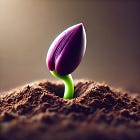hope is a four-letter word
why giving up hope might actually free you 🤍
Hope is a four-letter word.
It sounds soft and glowy. But too often, it’s just a mirage shimmering on the edge of collapse. A sugar rush in a famine. A flickering match in a windy cave.
We reach for it when the world feels too heavy to hold. We whisper it like a spell.
Hope is fragile. And when that hoped-for future doesn’t arrive, hope collapses into despair.
despair
We’ve been taught that hope is the opposite of despair. But really, they’re two hands gripping the same, thinning thread.
Both hope and despair are attached to imaginary futures. Both are built on the false belief that we know what’s coming.
Hope clings to the good outcome, despair clings to the bad one.
Neither is grounded in reality. There is nothing to hold you when the wind picks up.
There is another way: If we begin to look at the whole horizon — not just the sunrise, not just the storm — we can start to see the full field of possibility.
Not to control it. Not to predict it. Just to see it.
If you want to add your voice to the conversation, this is a good place to do it. I write every week, and I read the comments with care.
addiction
In dark times, hope is marketed like a medicine. But more often, it’s like a drug.
A quick hit of “maybe,” followed by a crash of “still no.”
We cling to bits of good news like lifeboats, only to find they leak. And so we chase the next high. And the next. And the next.
But none of it fills the hole of doubt inside of us.
Because hope is a hollow, seductive escape. It’s a lottery ticket you can clutch with a heart full of dreams until the numbers are announced and you find you didn’t win.
There is more nourishment in doubt than in hope. Doubt is real. Doubt is honest. Doubt will never lie to you.
When we crawl into the hole of doubt — when we stop trying to claw our way out of it and instead let our eyes adjust to the dark — we see something important: the hole of doubt is actually an ocean of possibility.
Vast. Surging. Brimming with currents both terrifying and beautiful.
The unknown is not a void. It’s a field. And in fields, anything can grow.
prediction & participation
Change is fractal, nonlinear, and emergent—and our job is to stay in relationship, not to control the outcome.
Hope makes us fixate on what might happen.
When we do that, we start obsessing over prediction:
Will this be the year it turns around?
Will things get better soon?
Is there still time?
These questions point us away from power and into paralysis. What we actually crave is not answers, but agency.
The shift is small, but seismic: from prediction to participation.
You don’t need to see the end of the story to be part of it.
We are not the architects of certainty. We are gardeners of possibility. Gardens don’t need predictions. They need water. They need hands. They need time.
desire
Desire doesn’t require certainty.
Desire can live in uncertainty. It can breathe in the unknown.
You can want something deeply, work toward it with everything you have, without ever knowing how (or if) it will come.
This is how we create vision without attachment: not by pretending to know the path, but by staying in relationship with what we long for, and letting that longing shape how we act in the present.
You don’t need to believe in a guaranteed future to move toward the one you desire. You only need to stay connected to what you care about. To move toward it anyway.
To build, to tend, to imagine—without needing certainty in return.
Hope demands reassurance.
Desire just asks you to begin.
the only thing we know for sure
One day Alice came to a fork in the road and saw a Cheshire cat in a tree.
‘Which road do I take?’ she asked.
‘Where do you want to go?’ was his response.
‘I don’t know,’ Alice answered.
‘Then,’ said the cat, ‘it doesn’t matter.’
We can’t know what comes next. The only true thing we can cling to is: we don’t know.
Not-knowing is sacred. It’s the ground beneath our feet. When we accept it, something in us steadies. Not knowing doesn’t mean nothing is possible. It means anything is possible.
When we fixate on one imagined future—good or bad—we stop seeing the full field of possibility. We narrow our vision. We shrink our range of response.
Letting go of hope means opening ourselves to the truth: anything can happen.
Good things. Hard things. Unimaginable things.
Our wildest dreams and our wildest nightmares are all possible.
Shaping the future means having the humility to accept that our actions may do absolutely nothing, because anything is possible. But also the wisdom to accept that we may have exactly what it takes to achieve our wildest dreams, because anything is possible.
Note:
When I did this exercise, I found I was far more scared to accept that I could have exactly what it takes. I think it is natural. Having spent most of my life protecting against failure, it was unknown territory to consider the success case.
But, when viewing the future as a field of possibility, the success and failure cases are equally important and deserve equal consideration. I was surprised how hard it was to think about the success case. And how differently I feel after spending just a small amount of energy in the success case.
My first big surprise is that I actually had no idea what the success case looked like. I was well-practiced at identifying “not good enough” from years of “holding people accountable” but realized I was actually terrible at identifying what “good enough” would look like. This is important.
<3
bri
I read every reply. You don’t need to say anything “profound”—just write what’s true for you. Hit 'reply' or send me a message below.
Further reading -
For more like this, follow me wherever you connect with friends:
Bluesky 💖 LinkedIn 💖 Mastodon 💖 X 💖 Instagram 💖 TikTok 💖 Threads 💖 YouTube 💖 Facebook 💖 Pinterest
With love, Bri Chapman





Bri, this piece cuts deep in the most grounding way. Your framing of hope and despair as two hands clinging to the same thread is disarmingly honest — a quiet dismantling of the stories we’re sold about resilience. Letting go of hope, as you suggest, isn’t about nihilism, but about clearing space for something more rooted: participation, presence, and a kind of radical trust in not-knowing. The imagery of doubt as an ocean and the future as a field is especially powerful — it flips the narrative from fear to possibility without ever sugar-coating the uncertainty.
What struck me most was your reflection on the success case — how foreign, even frightening, it can feel to imagine things going right. That moment of vulnerability rings so true for anyone who’s built their identity around surviving rather than thriving. It’s an invitation not just to act, but to reimagine what we believe we’re worthy of. Thank you for writing with such clarity and compassion.
Desire can be a wonderful part of life, something to savor for its own sake.
And hope can be very important in helping us move forward as it may also help us cling to an unhealthy past.
One of things that comes up for me about hope these days is that “hope is not a plan.”